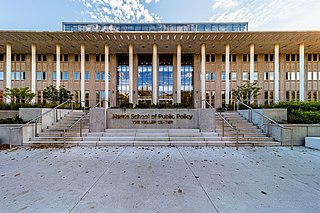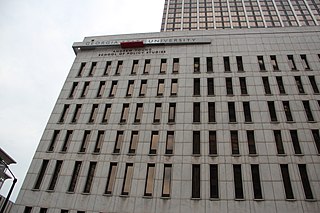
Carnegie Mellon University (CMU) is a private research university in Pittsburgh, Pennsylvania. The institution was established in 1900 by Andrew Carnegie as the Carnegie Technical Schools. In 1912, it became the Carnegie Institute of Technology and began granting four-year degrees. In 1967, it became Carnegie Mellon University through its merger with the Mellon Institute of Industrial Research, founded in 1913 by Andrew Mellon and Richard B. Mellon and formerly a part of the University of Pittsburgh.

The Catholic University of America (CUA) is a private Catholic research university in Washington, D.C. It is a pontifical university of the Catholic Church in the United States and the only institution of higher education founded by the United States Conference of Catholic Bishops. Established in 1887 as a graduate and research center following approval by Pope Leo XIII, the university began offering undergraduate education in 1904. It is classified among "R2: Doctoral Universities – High research activity".

The Maxwell School of Citizenship and Public Affairs is the professional public policy school of Syracuse University, a private research university in Syracuse, New York. The school is organized in 11 academic departments and 13 affiliated research centers and offers coursework in the fields of public administration, international relations, foreign policy, political Science, science and technology policy, social sciences, and economics through its undergraduate (BA) degrees, graduate Master of Public Affairs (MPA), Master of Arts (MA), and PhD degrees.

Cochin University of Science and Technology (CUSAT) is a state government-owned autonomous university in Kochi, Kerala, India. It was founded in 1971 and has three campuses: two in Kochi and one in Kuttanad, Alappuzha, 66 km (41 mi) inland.
The National Human Genome Research Institute (NHGRI) is an institute of the National Institutes of Health, located in Bethesda, Maryland.

The University of Chicago Harris School of Public Policy is the public policy school of the University of Chicago in Chicago, Illinois, United States. It is located on the University of Chicago's main campus in Hyde Park. The school's namesake is businessman Irving B. Harris, who made a donation that established the Harris School in 1986. In addition to policy studies and policy analysis, the school requires its students to pursue training in economics and statistics through preliminary examinations and course requirements. Harris Public Policy offers joint degrees with the Booth School of Business, Law School, School of Social Service Administration, and the Graduate Division of the Social Sciences.
The School of Public and International Affairs (SPIA) at Virginia Tech offers graduate and undergraduate education in the fields of public administration, public policy, international affairs, urban affairs, and urban & regional planning. It has three campuses throughout Virginia: Arlington; Blacksburg and Richmond.

The College of Arts and Letters is the oldest and largest college within the University of Notre Dame. The Dean of the College of Arts and Letters is Sarah Mustillo.
The American University School of Public Affairs (SPA) is an institution of higher education and research located in Washington, D.C. that grants academic degrees in political science, public administration, public policy, and justice, law, and criminology. Established in 1934 as part of American University, the school houses three academic departments - Public Administration & Policy, Government, and Justice, Law & Criminology - as well as ten centers and institutes.

Brian Joe Lobley Berry is a British-American human geographer and city and regional planner. He is Lloyd Viel Berkner Regental Professor in the School of Economic, Political and Policy Sciences at the University of Texas at Dallas. His urban and regional research in the 1960s sparked geography’s social-scientific revolution and made him the most-cited geographer for more than 25 years.

The Andrew Young School of Policy Studies at Georgia State University houses the Departments of Criminal Justice & Criminology, Economics, and Public Management & Policy, School of Social Work, and the Urban Studies Institute. Georgia State University is the largest university in the state of Georgia.
Jonathan D. Moreno is an American philosopher and historian who specializes in the intersection of bioethics, culture, science, and national security, and has published seminal works on the history, sociology and politics of biology and medicine. He is an elected member of the National Academy of Medicine.
The Institute for International Economic Policy is a research institution dedicated to the study of global economic governance, based in Washington, DC at the Elliott School of International Affairs of the George Washington University. Notable IIEP members include Sabina Alkire, James Foster, and Jeni Klugman. Partnerships with organizations like the World Bank Group, International Monetary Fund, Internet Society, and The Nature Conservancy have led to academic conferences and policy seminars.

The Trachtenberg School, officially the Trachtenberg School of Public Policy and Public Administration (TSPPPA), is the graduate public policy school in the Columbian College of Arts and Sciences of the George Washington University, in Washington, D.C.
The Fletcher School of Law and Diplomacy is the graduate school of international affairs of Tufts University, in Medford, Massachusetts. Fletcher is one of America's oldest graduate schools of international relations. As of 2017, the student body numbered around 230, of whom 36 percent were international students from 70 countries, and around a quarter were U.S. minorities.

The Bush School of Government and Public Service is an undergraduate and graduate college of Texas A&M University founded in 1997 under former US President George H. W. Bush's philosophy that "public service is a noble calling." Since then, the Bush School has continued to reflect that notion in curriculum, research, and student experience and has become a leading international affairs, political science, and public affairs institution.
Richard Paul Taub was an American sociologist noted for his research on urban, rural, and community economic development. He was a faculty member of the University of Chicago's Department of Sociology and Department of Comparative Human Development and was also the Paul Klapper Professor in the Social Sciences.

The Witherspoon Institute is a conservative think tank in Princeton, New Jersey founded in 2003 by Princeton University professor Robert P. George, Luis Tellez, and others involved with the James Madison Program in American Ideals and Institutions. Named after John Witherspoon, one of the signers of the United States Declaration of Independence, the institute's fellows include Harold James, John Joseph Haldane, and James R. Stoner, Jr.

The contributions of women in climate change have received increasing attention in the early 21st century. Feedback from women and the issues faced by women have been described as "imperative" by the United Nations and "critical" by the Population Reference Bureau. A report by the World Health Organization concluded that incorporating gender-based analysis would "provide more effective climate change mitigation and adaptation."
Stephen Frederick Schneck is an American Catholic activist.
















